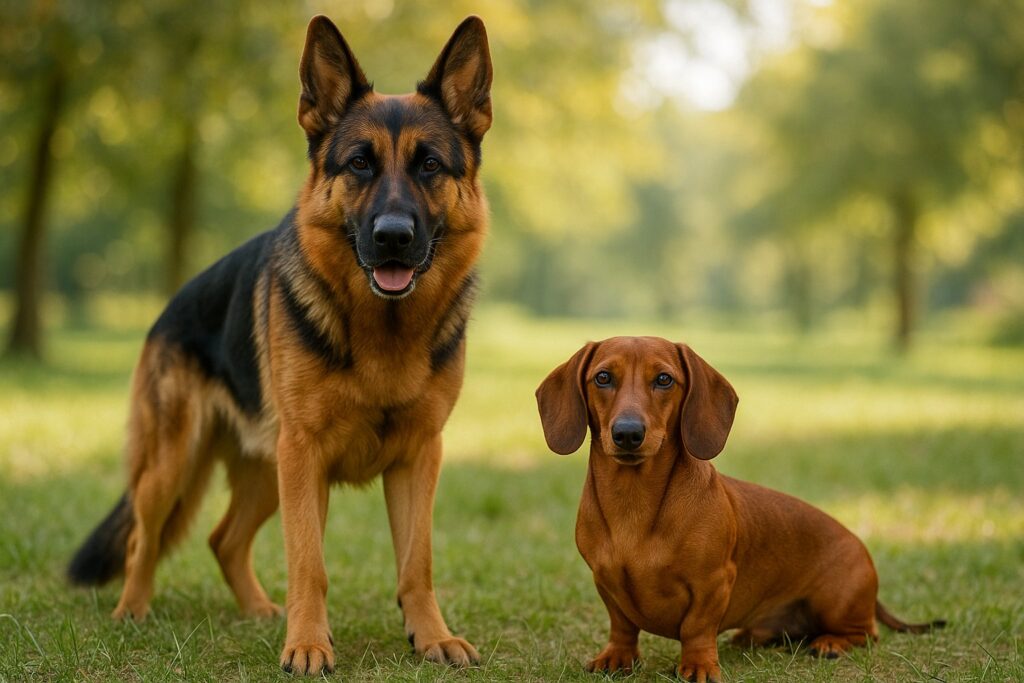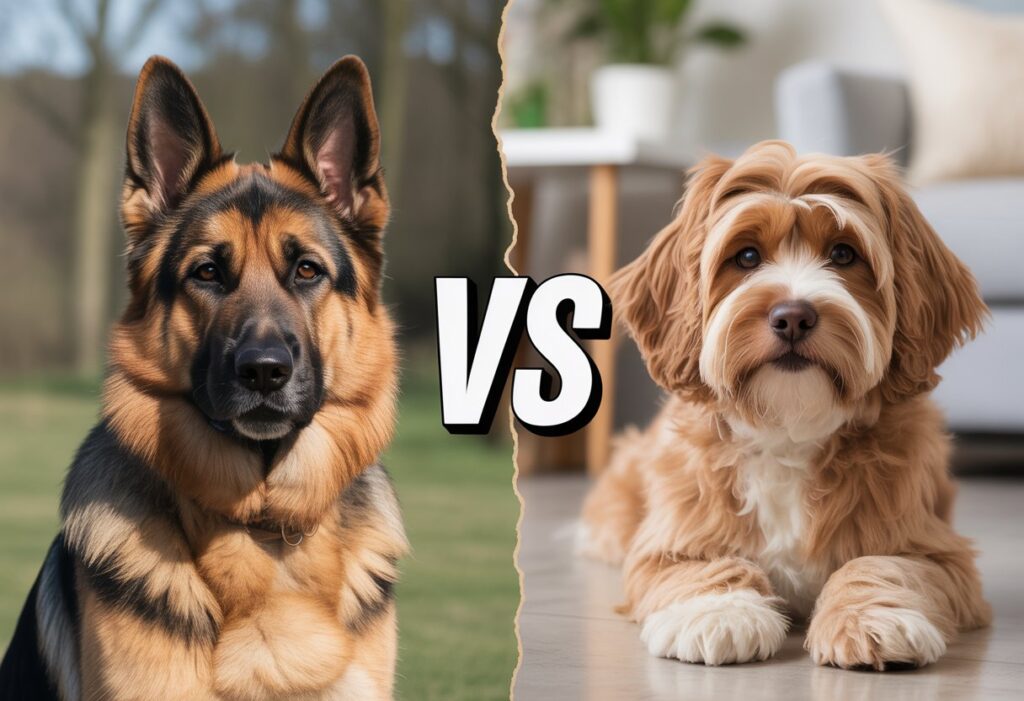Choosing between a Cavalier King Charles Spaniel and a Bichon Frise isn’t easy. Both breeds are adored for their friendliness and sweet faces.
If you’re after a gentle, affectionate companion, you’ll find both breeds shine, but they do differ in energy, grooming, and health. Picking apart those differences can help you figure out which dog really fits your home and daily life.
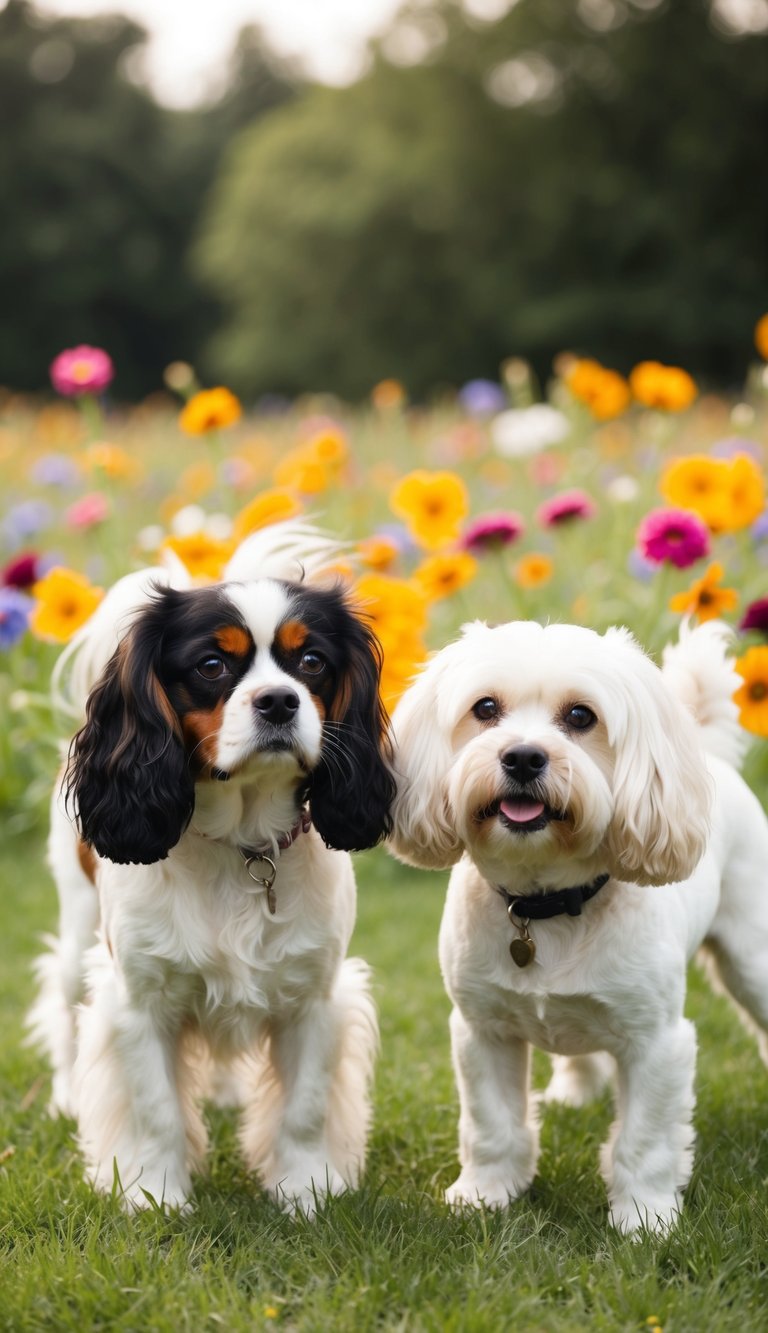
Maybe you’re asking yourself which breed is better for families, or which one’s less work, or even just which matches your vibe. Each breed brings its own quirks—think shedding, lifespan, daily walks, and playtime. Let’s look at how they stack up in personality, care, and more by diving into this Cavalier King Charles Spaniel vs Bichon Frise guide.
Breed Overview
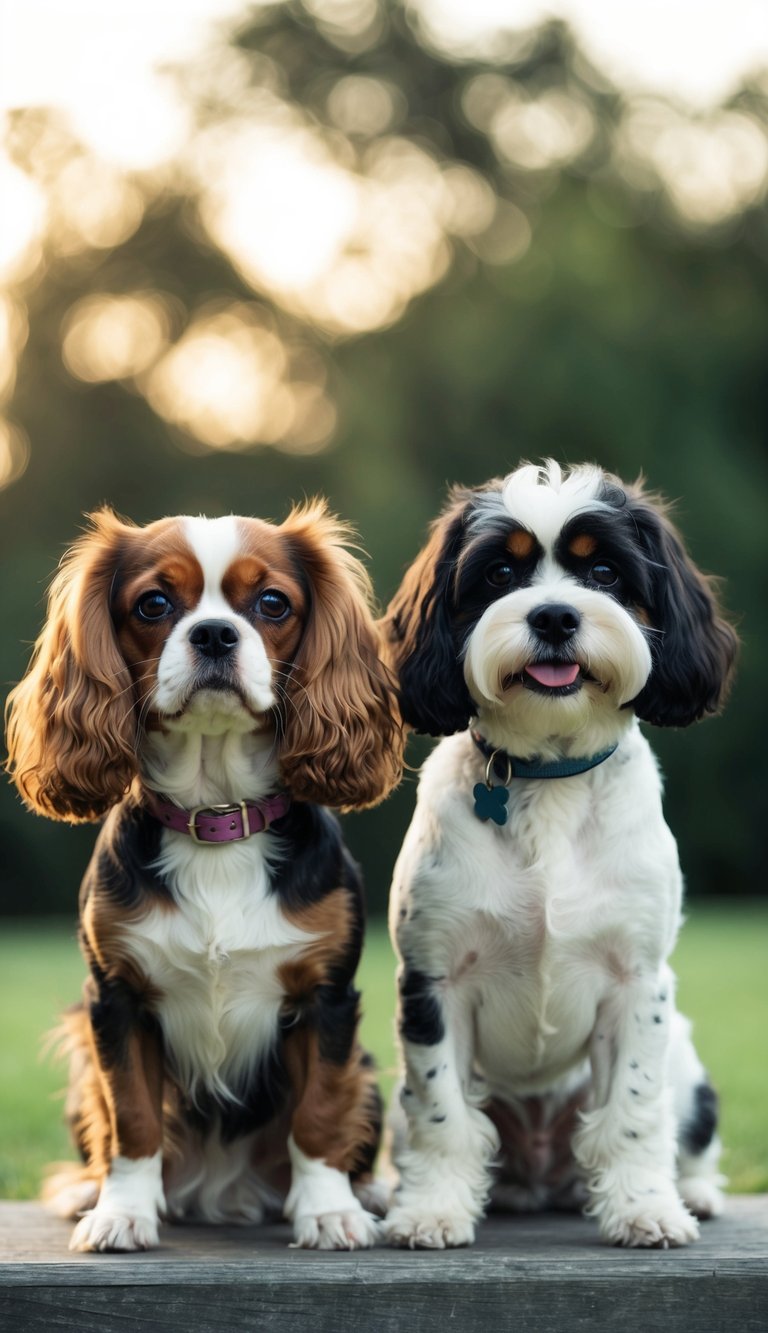
The Cavalier King Charles Spaniel and the Bichon Frise are both small companion dogs. Their histories, looks, and breed standards set them apart, though.
Both started as lap dogs and are still loved for their gentle, friendly personalities.
History and Origins
The Cavalier King Charles Spaniel has royal roots in England. Named after King Charles II, this breed became a favorite among British nobility in the 1600s.
Cavaliers were bred to be gentle and loving, and you can still see a bit of that royal flair in their elegant look and calm nature. The Bichon Frise, on the other hand, hails from the Mediterranean.
They probably descended from poodles and spaniel-type dogs. Bichons became popular in France and Spain, hanging out with sailors and nobles.
Their name means “curly lap dog” in French, which totally fits their puffy coats and cuddly vibe. Today, both are recognized as classic companion dogs and toy breeds.
Breed Standards
The Cavalier King Charles Spaniel is a small toy dog, usually weighing 13-18 pounds and standing 12-13 inches tall. Their silky coats come in Blenheim, tricolor, ruby, or black and tan.
Cavaliers have round eyes, a sweet look, and long, feathered ears. The Bichon Frise is a bit smaller, weighing 12-18 pounds and standing about 9-12 inches tall.
You’ll spot a Bichon by its fluffy, curly white coat, dark round eyes, and that perky tail curling over its back. The American Kennel Club has more on these unique breed standards. Both breeds must meet these rules to compete in dog shows—don’t confuse them with crossbreeds.
Physical Characteristics
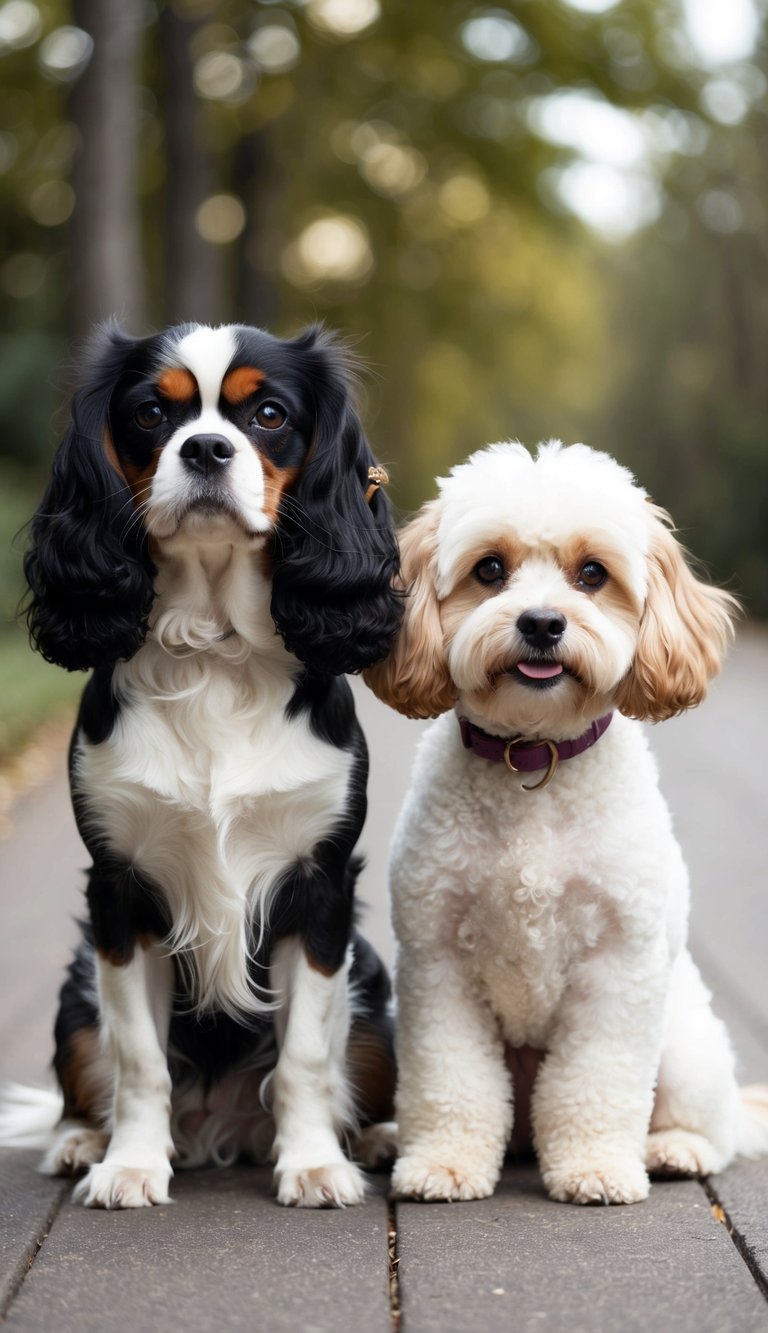
The Cavalier King Charles Spaniel and the Bichon Frise are both toy breeds. But honestly, you’ll never mistake them for each other.
Size, coat, and their whole vibe make it easy to tell them apart.
Size and Weight
Cavalier King Charles Spaniels usually weigh 13 to 18 pounds (6 to 8 kg). They stand around 12 to 13 inches at the shoulder.
The Bichon Frise is a bit smaller and lighter. Most Bichons weigh 10 to 18 pounds (4.5 to 8 kg) and stand 9.5 to 11.5 inches tall.
Both breeds are definitely small, but Cavaliers tend to be taller and look a bit longer and more slender. Bichons look rounder, partly because of their sturdy build and that fluffy coat.
Want a side-by-side size breakdown? Here’s one: Bichon Frise vs Cavalier King Charles Spaniel.
Coat Types and Colors
The Cavalier King Charles Spaniel sports a silky, medium-length coat. Their fur lies flat and feels super soft.
You’ll see feathering on their ears, chest, legs, and tail. Cavaliers do shed, but their coats don’t tangle too badly.
Cavaliers come in four main colors:
- Blenheim (chestnut and white)
- Tricolor (black, white, and tan)
- Ruby (solid red)
- Black & Tan
The Bichon Frise has a double coat. The outer layer is curly and puffy, and the undercoat is soft and dense.
That’s what gives Bichons their signature round, fluffy look. Their coat is almost always white, though you might see cream or apricot in puppies.
Bichon hair keeps growing and needs regular grooming to avoid mats. Their coat is often called hypoallergenic, since it sheds less dander.
Appearance Differences
Cavalier King Charles Spaniels have a gentle expression, big dark eyes, and long, droopy ears. Their heads are a bit rounded, and their muzzles are short but defined.
Their bodies run a little longer than they are tall, giving them a graceful, slightly elegant look. Bichon Frises, though, look totally different.
Their faces are round, with dark, expressive eyes and a black nose. The ears hang down and blend into that fluffy, round head.
Their tails curl over their backs, adding to their plush, toy-like appearance. Cavaliers remind you of classic spaniels—refined, but not too delicate.
Bichons look more like a little cloud on legs, with a compact, sturdy frame. Want to see side-by-side photos and more? Check out the Bichon Frise vs Cavalier King Charles Spaniel page.
Temperament and Personality
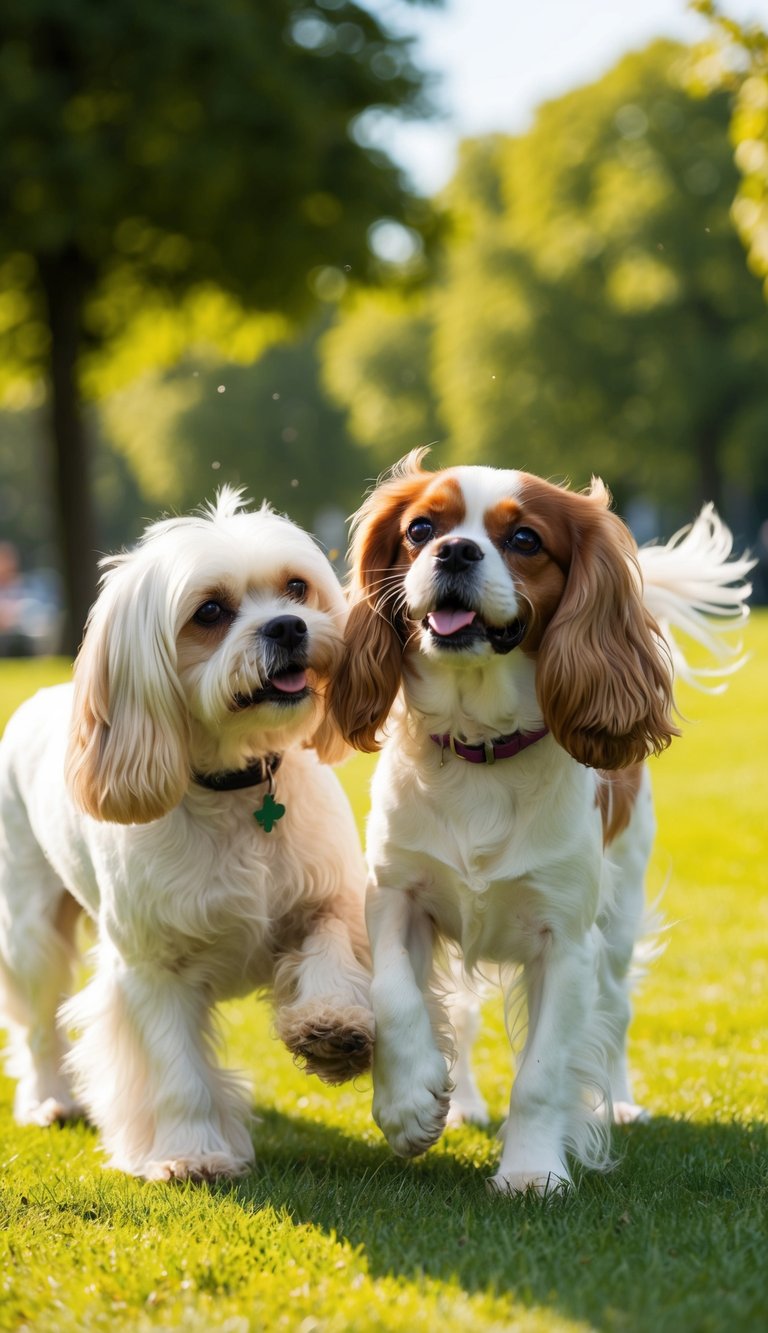
Both the Cavalier King Charles Spaniel and the Bichon Frise are known for their friendly, easy-going personalities. If you want a loving, loyal companion, either breed could work.
Social Nature
Cavalier King Charles Spaniels are incredibly social. They form strong bonds with their families and want to be near people all the time.
If you leave them alone too long, they can get anxious. Cavaliers usually get along with kids, adults, and other pets without much fuss.
Bichon Frises are just as social and even a bit more cheerful. They greet new people with excitement and love to play.
They also hate being alone and might bark or act out if they get lonely. Neither breed is aggressive—they’d rather hang out and get attention than guard the house.
Consistent socialization helps prevent little dog attitude, where a pup gets bossy if you don’t set boundaries.
Suitability for Families
If you’ve got kids or other pets, both breeds fit in well. Cavaliers are gentle and patient, so they’re great with young children.
They tolerate handling and love family games. Bichon Frises are playful and energetic, always up for kids’ activities.
They’re sturdy enough for gentle play, but still small, so watch out with toddlers. Both breeds usually adapt to different routines and lifestyles.
Neither the Cavalier nor the Bichon needs to be “top dog.” They respond best to positive reinforcement and gentle leadership.
That makes them ideal for homes wanting a loving, easygoing companion who just blends into daily life. Curious about their temperaments side by side? Here’s a Bichon Frise vs Cavalier King Charles Spaniel comparison.
Exercise and Mental Stimulation
These breeds have different energy levels and focus, which affects their health and happiness. Both need daily activity, but their routines and favorite games aren’t quite the same.
Activity Needs
The Cavalier King Charles Spaniel needs daily exercise to stay healthy and avoid extra pounds. A brisk walk or active play for 30–60 minutes usually does the trick.
Cavaliers love fetch, chasing toys, and exploring outside. Bichon Frises also need regular movement, but they’re often a bit calmer.
About 30 minutes of activity each day is enough for most Bichons. They like gentle walks and indoor play.
Both breeds can live in apartments, but Cavaliers often want more outdoor time. Bichons tend to be more relaxed inside.
Curious about their energy? Check out this breed comparison.
Mental Engagement
Both breeds need mental stimulation to avoid boredom. Cavaliers love social games, short training sessions, and puzzle toys.
They’re eager to learn tricks and respond well to treats or praise. Bichon Frises are smart and alert.
Short, positive training sessions work best for them, with lots of repetition. Puzzle feeders, hide-and-seek with treats, and simple agility games keep their minds busy.
Both breeds enjoy activities that involve you. Switching up toys and adding new challenges helps keep them interested.
Mental and social activities help keep them calm and prevent unwanted behaviors.
Training and Socialization
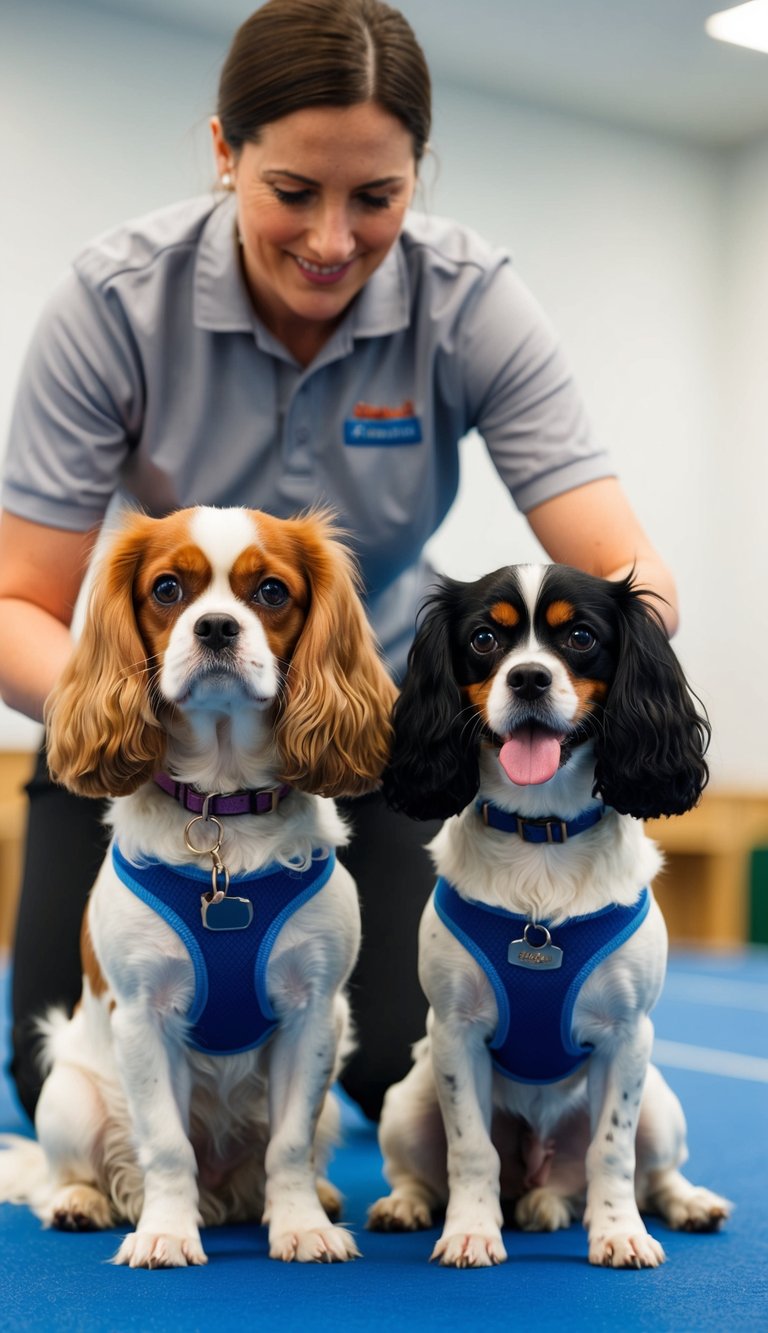
Cavalier King Charles Spaniels and Bichon Frises both have friendly personalities. With the right approach, you can help either breed develop good manners and fit right into family life.
Trainability
The Cavalier King Charles Spaniel wants to please and picks up commands fast. Treats and praise work wonders for this breed.
Cavaliers enjoy short, playful training sessions. Their gentle nature suits first-time owners.
You can read more about the Cavalier’s temperament and trainability if you’re curious.
Bichon Frises are smart and catch on to training cues quickly. Food rewards and learning tricks keep them engaged.
Sometimes, Bichons act a bit stubborn, so you’ll need patience and consistency. Both breeds benefit from early socialization to help them grow into confident adults.
| Breed | Trainability | Motivation | Best Method |
|---|---|---|---|
| Cavalier | High | Praise, Treats | Positive Reinforcement |
| Bichon Frise | Moderate-High | Food, Play | Short, Consistent Sessions |
Dealing with Behavioral Issues
Cavaliers often struggle with separation anxiety if left alone for long periods. They need company and do best when someone’s around most of the day.
Bichons may also get anxious alone, sometimes barking or acting out when bored. Without clear boundaries, both breeds can develop small dog syndrome—things like excessive barking or guarding.
Setting rules and using gentle, firm discipline helps keep bad habits in check. Socializing with people and pets early on lowers the risk of fear or aggression.
Short walks, puzzle toys, and games give both breeds an outlet for energy. Puppy classes are a great way to combine socialization and training.
If you want more details, check out this comparison of Bichon Frise and Cavalier King Charles Spaniel personalities.
Health and Lifespan
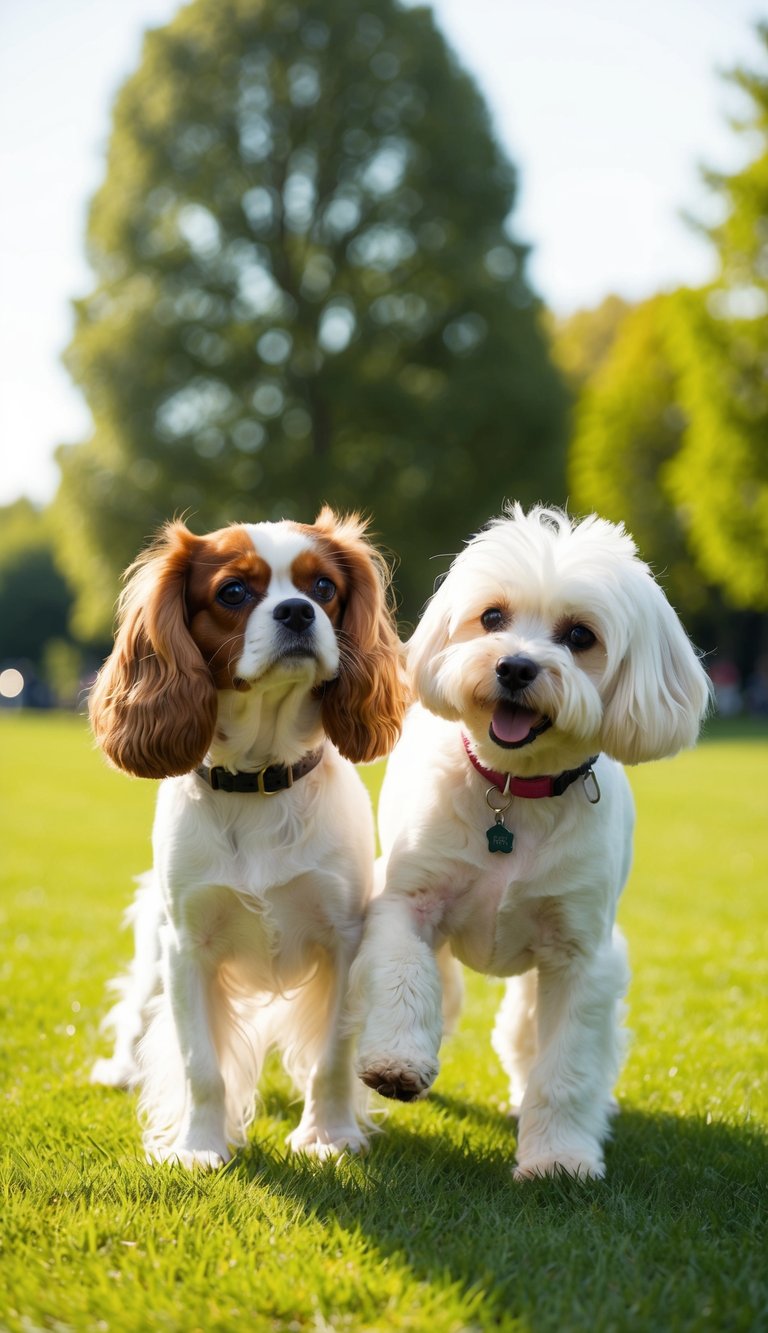
The Cavalier King Charles Spaniel and the Bichon Frise are both popular companions, but their health risks and life expectancies aren’t the same. Knowing the main concerns for each breed can help you plan ahead.
Common Health Issues
Bichon Frises usually live 12 to 15 years. They tend to be healthy, but you should watch for allergies, skin issues, dental disease, and patellar luxation.
Tear stains and bladder stones sometimes show up in Bichons too. Cavaliers, on the other hand, live around 9 to 15 years and face more serious problems.
Heart disease, especially mitral valve disease, is common in Cavaliers as they age. Their floppy ears make them prone to ear infections.
Cavaliers can also develop neurological issues, like chiari-like malformation and syringomyelia. These problems may cause pain, sensitivity, or trouble walking.
Some dogs yelp when moving, scratch their heads, or even develop paralysis. Treatments vary—your vet might recommend medication or surgery, depending on how bad things get.
If you want a deep dive, here’s a Cavalier King Charles Spaniel vs Bichon Frise comparison.
Genetic Concerns
Genetics play a big role in each breed’s health. Cavaliers carry several inherited conditions, like syringomyelia and mitral valve disease.
Chiari-like malformation is another issue and it often leads to syringomyelia. Not every dog will show symptoms, and some live with mild forms, but severe cases usually need regular vet care.
Some researchers are running clinical trials for new treatments because these conditions can be pretty rough. Genetic screening for Cavalier puppies is a smart move if you want to lower the risk.
Bichon Frises have their own genetic issues, mostly with joints and the immune system. Hip dysplasia, allergies, and patellar luxation are common.
Responsible breeders test for these problems to boost the odds of healthy pups. If you buy from a breeder who screens for genetic issues, your dog’s long-term health will likely benefit.
Grooming and Care
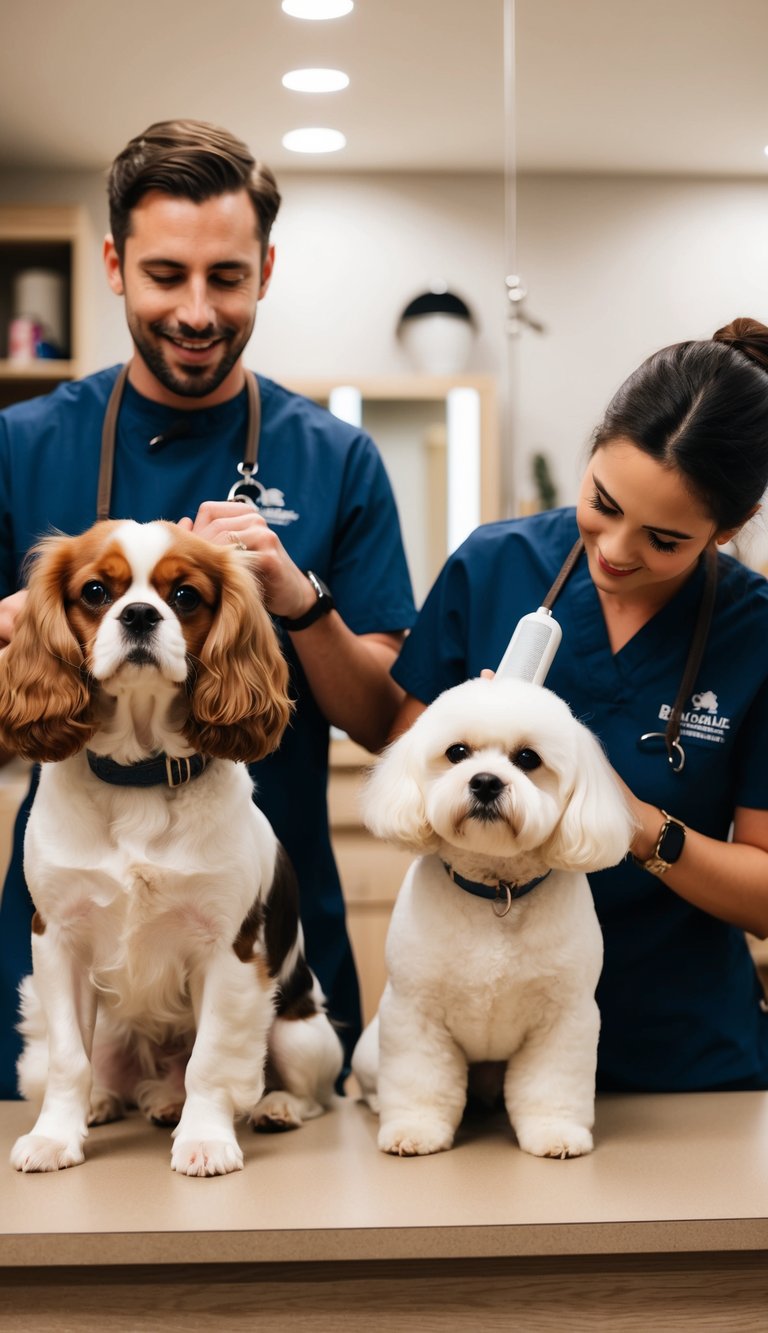
Grooming a Cavalier King Charles Spaniel is nothing like grooming a Bichon Frise. Coat texture, grooming tools, and time commitment all play a part.
Grooming Needs
The Bichon Frise sports a soft, curly double coat that grows fast. It’s mostly white and needs brushing at least 3-4 times a week to keep mats away.
You’ll need to trim a Bichon’s coat every 4 to 6 weeks. Regular baths keep their fur clean and fluffy. Without this, the coat tangles and collects dirt.
Bichons barely shed, but their hair grabs onto debris. Cavaliers have silky, medium-length fur and do shed, but not as much as some breeds.
Their coats come in Blenheim, tricolor, ruby, and black & tan. Brushing 2-3 times a week helps prevent tangles and catches loose hair.
Cavaliers need their ears cleaned often and the fur on their feet trimmed. You can check out a more detailed breed comparison if you’re curious.
Maintenance Tips
Use a slicker brush and metal comb for Bichons to reach through thick curls and prevent mats. Professional groomers can handle haircuts and nail trims.
A soft-bristle brush works best for Cavaliers to avoid damaging their fine fur. Check their ears weekly since floppy ears trap moisture.
Brush both breeds’ teeth several times a week to keep dental issues at bay. Trim nails every 3-4 weeks for both.
Set a routine. Jot down your schedule for baths, brushing, and check-ups so your dog’s coat stays healthy.
Here’s a side-by-side breed guide with more advice.
Compatibility with Other Pets
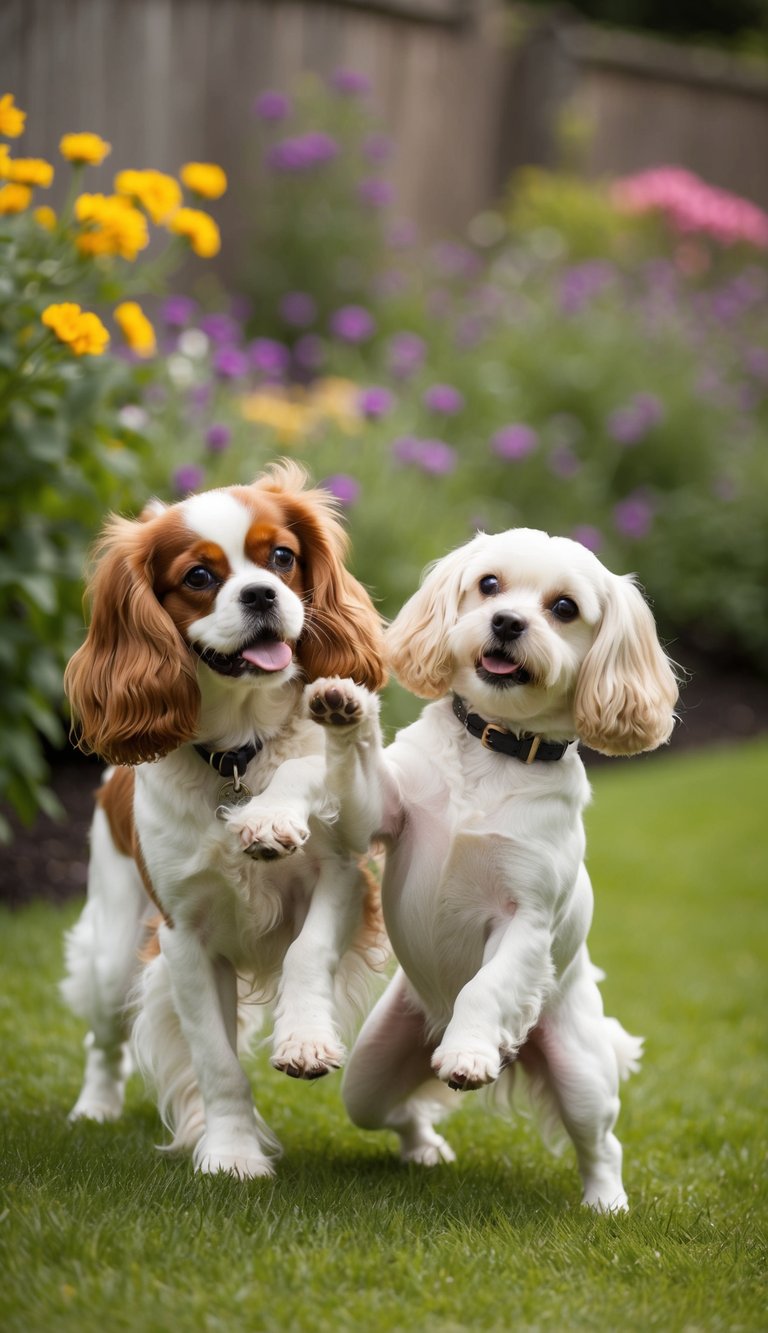
Cavalier King Charles Spaniels and Bichon Frises usually have easygoing personalities, so they fit well in homes with other animals. Still, their behavior can shift depending on what other pets you’ve got.
Living with Other Dogs
Cavaliers are gentle and social, getting along with most breeds. They blend in nicely with shih tzus, yorkshire terriers, toy poodles, and other friendly, moderate-sized dogs.
If you have a beagle, dachshund, or miniature schnauzer, a Cavalier’s laid-back attitude helps keep things peaceful. Bichon Frises are playful and not dominant, so they mix well with dogs like maltese, pugs, pomeranians, and even some bigger, calm breeds like labradors.
Bichons don’t always do well with rough or bossy breeds like boxers or dobermans. Both breeds prefer friendly, non-aggressive dog companions.
For more details, check this temperament comparison.
Multi-Pet Households
Most of the time, both breeds adapt well to living with other animals—cats, rabbits, or even guinea pigs. Cavaliers are gentle and rarely bother smaller pets.
They usually settle in without much trouble, even around birds or pocket pets. Bichon Frises are curious but polite, and their low prey drive makes them unlikely to chase cats or stress out smaller animals.
Slow introductions and close supervision help things go smoothly at first. Cavaliers might get overwhelmed by big, high-energy breeds like border collies or golden retrievers, so keep an eye on those interactions.
Both breeds do best with steady routines and positive reinforcement. You can find more advice using this AKC dog breed comparison tool.
Puppy Considerations
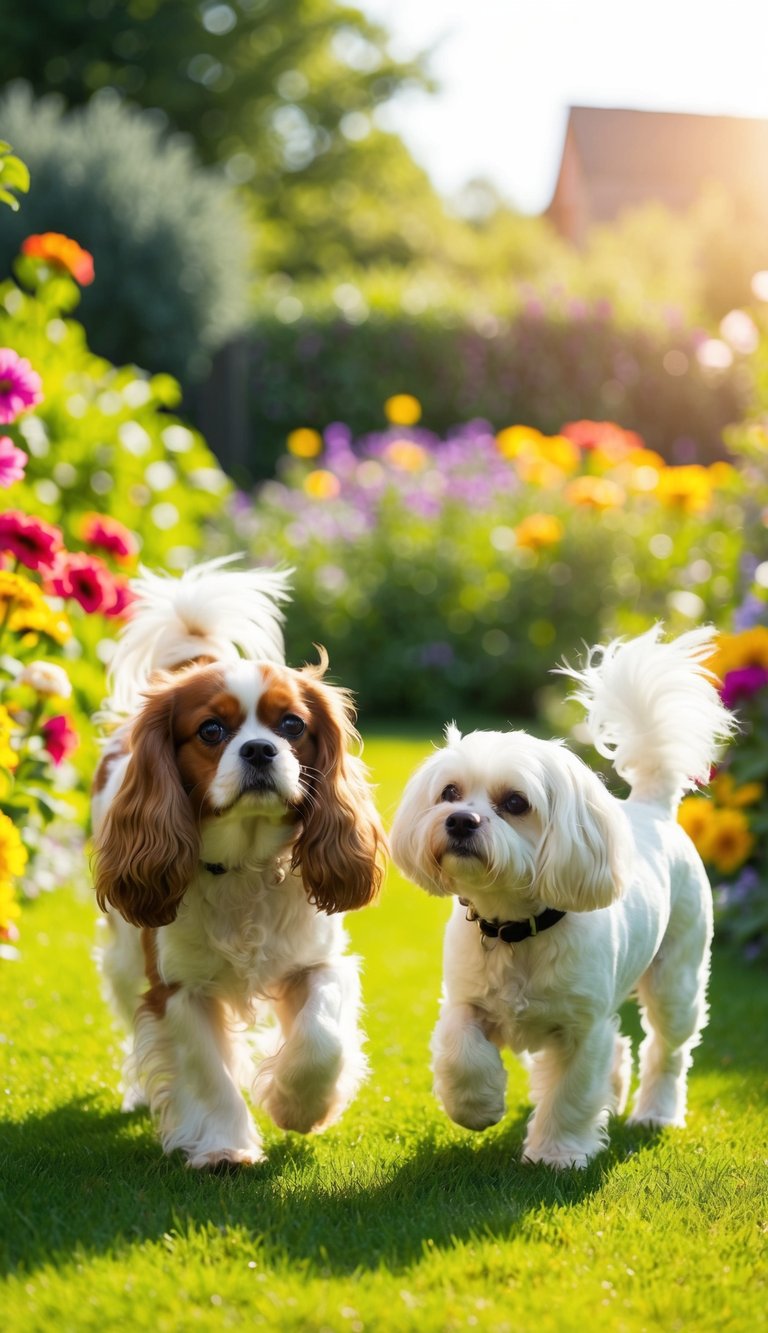
Bringing home a Cavalier King Charles Spaniel or Bichon Frise puppy is exciting, but you’ll need to be ready and know what’s coming. Picking the right puppy and starting socialization early really pays off.
Selecting a Puppy
Choosing between a Cavalier, Bichon, or a Cavachon mix takes some thought. Find a breeder who screens for health problems and breeds responsibly.
Ask for health clearances, especially for heart and eye issues in Cavaliers. For Bichon puppies, look for a clean coat and a curious, alert temperament.
Meet at least one of the puppy’s parents if you can—it gives you a feel for personality and health. Check out where the puppies live and ask about their early experiences.
A puppy raised with positive human contact will likely be more adaptable. With Cavachons, pay attention to which traits from each breed stand out.
Get ready for differences in grooming and health care. Cavalier King Charles Spaniel puppies may need regular checkups for inherited health risks, while Bichon Frise puppies demand steady coat care.
Early Socialization
The first few weeks and months shape your puppy’s future. Early socialization helps prevent fear and aggression down the line.
Expose your puppy to different sights, sounds, and people. Both breeds, and Cavachons too, are naturally friendly but gain a lot from early positive experiences at home and in public.
Start with brief, gentle introductions to new people and pets. Reward calm, curious behavior with treats and praise.
Puppy classes let your dog meet others safely and learn basic commands. Go slow—don’t force socialization.
Focus on building confidence, not stress. Stick to daily routines so your puppy feels secure and learns good habits. Play simple games and offer toys to encourage exploration and bonding.
Cost of Ownership
Buying a Cavalier King Charles Spaniel usually costs more up front than a Bichon Frise. Both breeds come with regular expenses for food, grooming, and vet visits.
Health costs can add up if your dog needs special treatment or develops long-term issues.
Upfront and Recurring Expenses
The price for a Cavalier King Charles Spaniel puppy from a trusted breeder usually falls between about $1,500 to $2,500. Sometimes, you’ll see prices go even higher if you’re looking at certain bloodlines.
Bichon Frise puppies tend to cost a bit less—about $700 and $1,000.
Initial costs don’t stop at the purchase price. You’ll also need to pay for spaying or neutering, vaccinations, and getting your home ready with basics like a bed, crate, bowls, and toys.
Most folks end up spending several hundred dollars just in those first few months. It adds up fast, honestly.
Recurring costs sneak up on you too—food, grooming, pet insurance, and supplies. Both Bichons and Cavaliers need regular grooming, which bumps up the budget.
Grooming services usually run $40–$70 per visit. Food for both breeds is pretty similar since they’re small; expect to spend around $25–$40 each month.
Veterinary Care
Both breeds need regular vet care. Cavaliers, though, have a reputation for more frequent health concerns, especially heart disease and ear infections.
These issues can mean higher vet bills and sometimes ongoing treatments. Annual checkups, shots, and flea or tick prevention are standard, usually costing $150–$300 a year for healthy dogs.
Bichons aren’t immune to trouble—dental problems and allergies can pop up, sometimes needing regular attention. Some dogs might need medication or extra care if there’s a chronic illness.
Signing up for a pet insurance plan can help with surprise medical bills or clinical trial treatments your vet suggests. Emergency care or surgery can get expensive quickly, so it’s smart to set aside a little extra cash just in case.
Summary of Key Differences
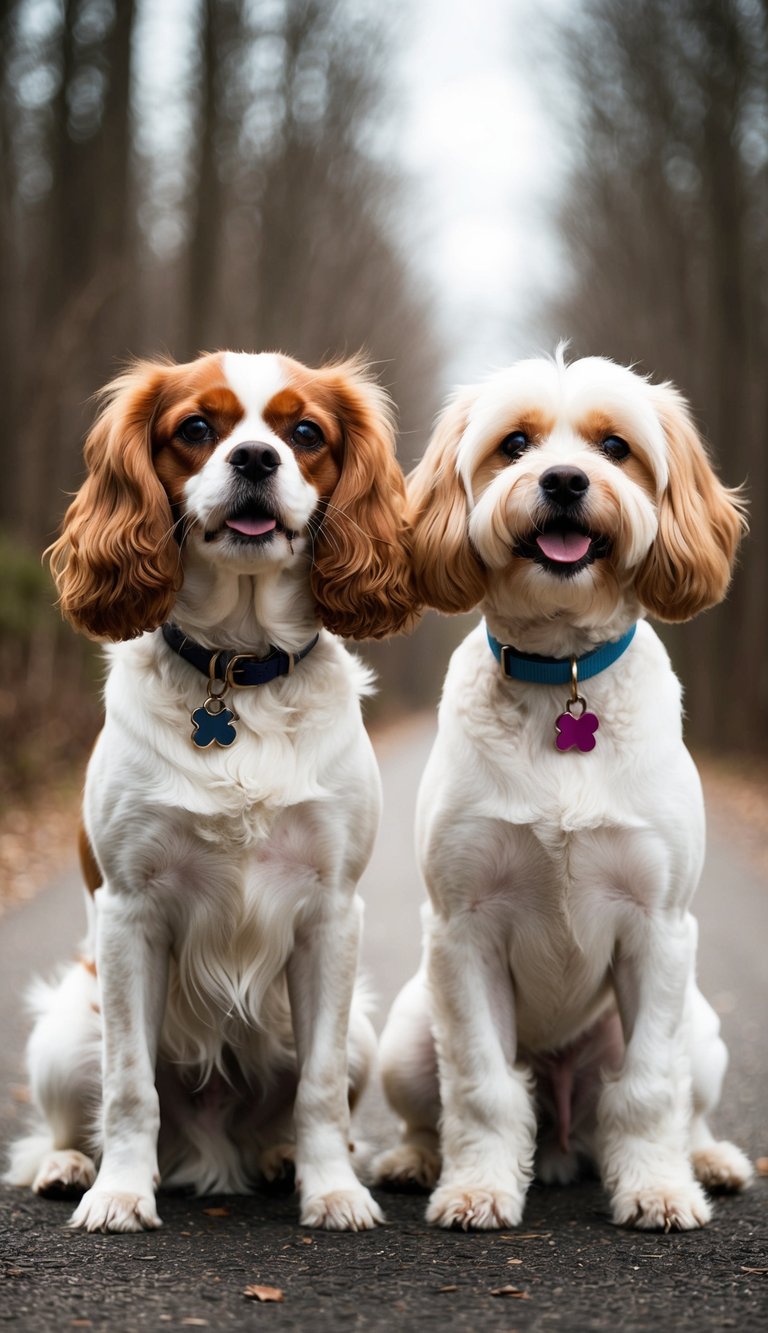
Cavalier King Charles Spaniel and Bichon Frise are both small companion breeds. Still, you can spot some pretty clear differences in how they look, act, and what it takes to care for them.
Appearance:
Cavaliers usually have long, silky fur and those signature feathered ears.
Bichons, on the other hand, sport a curly, fluffy coat that feels soft and puffy.
Cavaliers weigh in at about 13-18 pounds.
Bichons fall in a similar range, usually 12-18 pounds.
Temperament:
Cavaliers are gentle and friendly, the kind of dog that loves to be a lap buddy.
Bichons bring more energy and playfulness—they’re cheerful little entertainers and can be pretty lively around the house.
Both breeds do well with families.
If you want a mellower companion, Cavaliers might fit the bill a bit better.
Grooming Needs:
Bichons need regular brushing and trips to a professional groomer, or their thick, curly coat can get matted fast.
Cavaliers also need brushing, but honestly, their grooming routine is a bit simpler.
If you’d rather not spend much time on grooming, Cavaliers might be the easier choice here.
Learn more about grooming differences.
Health Concerns:
Cavaliers sometimes deal with inherited heart problems and other genetic issues.
Bichons are usually pretty healthy, though they can have allergies and skin troubles now and then.
Energy Level:
Bichon Frise tend to have a lower energy level, so they work well for folks who prefer a relaxed pace.
Cavaliers have moderate energy—they like walks but are just as happy to lounge on the couch.
Read more about their energy and temperament.
Here’s a quick summary table:
| Trait | Cavalier King Charles Spaniel | Bichon Frise |
|---|---|---|
| Coat Type | Silky, straight/wavy | Curly, soft |
| Size | 13-18 lbs | 12-18 lbs |
| Temperament | Calm, gentle | Cheerful, lively |
| Grooming | Moderate | High |
| Health Issues | More common | Less common |
| Energy Level | Moderate | Lower |


